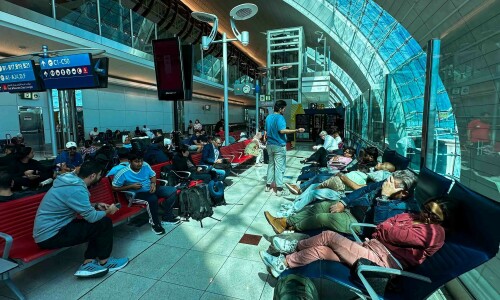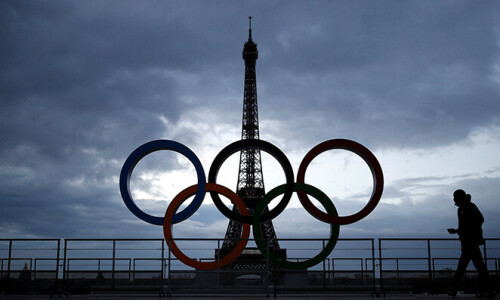WHILE the Middle East is still abuzz with the opening up of relations between Israel and the UAE and with Bahrain, people have largely ignored a similar move in the Balkans. Kosovo and Serbia, both countries that had thus far refused to recognise Israel, have now agreed to do so.
Obviously, the Trump administration has been doing some heavy lifting in both regions. Exactly what was promised to Kosovo and Serbia remains unclear. And incidentally, the latter has thus far refused to recognise its neighbour.
Clearly, the dictates of the US elections in November outweigh all other considerations with Donald Trump. Thus far, we were led to believe that greater trade, fear of Iran, and Israeli high-tech weaponry were the drivers behind the UAE’s decision to transform its covert ties with Israel into a full-blown relationship. But recent reports suggest that the UAE had been upset by being refused access to the American F-35 jet fighters due to Israeli objections.
According to American policy — now enacted as law— Israel must maintain a “qualitative military edge” over its neighbours. The deal that bought Netanyahu’s consent to the sale of the F-35 is recognition by the UAE. Blocking the annexation of large parts of Palestinian land is just a sop for the larger Muslim world as the Israeli prime minister has only promised to “halt” this provocative move for now.
Iran has driven many Arab states into the US-Israel camp.
So what makes the F-35 so special, and worth $80 million each? Largely, the radar-evading materials used in its construction, as well as the intelligence-gathering technology it carries. Israel fears that its secrets could fall into the hands of its foes. But should Trump lose the election — something to be fervently wished for — Biden may well halt the sale. And as we have seen from the botched attacks by the UAE air force on Yemen, the country’s pilots are not exactly skilled in their use of sophisticated aircraft.
Whatever the real reason, the fear of Iran is certainly one as the US withdraws from the region following its reduced dependence on Arab oil. Thus, Iran has succeeded in driving many Sunni Arab countries into the US-Israel camp. Even Saudi Arabia, once the champion of Palestinian rights, has permitted commercial flights over the kingdom to shorten the flying time between Israel and the UAE.
Jordan and Egypt have had embassies in Tel Aviv for decades, as has Turkey. So when the Turkish president protested loudly against the UAE and Bahrain’s recognition of Israel, we must take his words with a pinch of salt. But whether we like it or not, there is a growing movement towards normalisation of ties with the Zionist state. The younger generation of Arabs want job opportunities and peace, not a perpetual state of war with a powerful neighbour.
In a sense, the Palestinians have proved to be their own worst enemies. In Jimmy Carter, they had the friendliest American president they are likely to get. Bill Clinton did his best to push an agreement through. But the PLO’s rigidity and Israel’s hunger for land blocked any chance for genuine rapprochement. Now, with Trump’s openly pro-Israel policies, the US has dropped all pretence of being an honest broker between the two parties.
Having written dozens of columns critical of Israel’s land grab and oppressive policies, I have also argued that recognition is not a reward for good behaviour. Had this been so, half the world would not recognise the other half. With normalisation comes the right to summon an envoy to register a protest against illegal policies in his or her country.
With our head-in-the-sand attitude towards Israel, we can only observe from the sidelines. This is not exactly helpful to the Palestinians, even though they have described the UAE initiative as a “stab in the back”. Also, oil-rich Middle East states have become tired of having to dish out cash regularly to the corrupt administrations controlling the West Bank and Gaza. As oil revenues fall steadily with no recovery in sight, this subsidy is becoming increasingly unpopular.
So where does this realignment leave us? We are fixated on a policy laid down decades ago that dictated that Pakistan would only recognise Israel when all Palestinian land seized in the 1967 war was returned. But with over half a million Israelis living in dozens of settlements built in occupied West Bank, this was unlikely to happen. With a hawkish, right-wing alliance in power, it is even less likely. Even if Netanyahu is defeated, the consensus in Israel is that they need large chunks of the West Bank for security.
And while we rightly want justice for Palestinians, what are we doing about the ongoing persecution of Chinese Muslim Uighurs, or the attempted genocide of Muslim Rohingya in Myanmar? The shameful silence of the Islamic world on the plight of these two wretched communities says a lot for our moral bankruptcy.
Published in Dawn, September 19th, 2020
















































